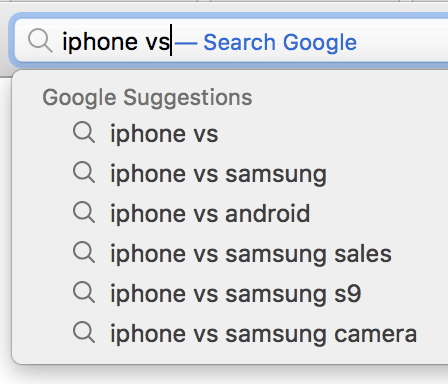Control how customers compare you against competitors

Competitive information is powerful
Over the years, as part of the work I do in the areas of strategic analysis, I’ve been engaged to perform competitive analysis and recommendations for my clients, who have typically been wanting to work out why customers choose a competitor, determine how their product stacks up against others, or to give their sales folks the information they need to position to prospects.
This information is powerful, especially if you take control of how the public consume it!
Competitive Intelligence (CI)
Competitive Intelligence is the name that is given to the research and analysis of a number of products and companies in a market. Businesses love CI because it helps them understand how to differentiate their product offering, make it stronger, price it, and also how to help their salesforce deal with “exception handling”, which is the notion of a prospective customer saying “XYZ company is cheaper,” or “they have more features,” and the list goes on.
Private vs Public CI
When I’m engaged to perform CI for a client, there is typically a cloak of secrecy about the project, sometimes for no good reason. The basic premise to performing CI projects is to get to know the market and product offerings really well, behave like a customer would using non-proprietary information, and analyse a number of areas. The use, gathering and analysis of public information isn’t really unique.
However, what is unique is when this information is interpreted into sales and product tactics in order to compete. The types of resulting business strategies are typically based around:
- Product pricing
- Campaigns
- Roadmap priorities
- Identified product weaknesses
- Positioning of superior solutions for specific vertical markets
- If-then-else sales motions when handling exceptions (second guessing how a customer might be turned off the client’s product in favour of a competitor)
This type of strategising and interpretation is where information should be tightly guarded and only used and distributed when necessary.
Take control of the comparisons
If your company makes a product, then no doubt there are review sites and analysts out there who write about it and compare it to others in the market. In the business of strategic analysis, we often do the “vs” test to figure out some of the most comparable products to a target. You simply jump into Google and type “product name vs” and see what appears using autocomplete. It’s fascinating to see what people are comparing your product against!
It’s not the only way of working out competitive products, and doesn’t work well for new products, but it is a solid way to get started.
The good news is that once you know what people are comparing your product against, you can take ownership of those comparisons, by writing your own web content. The best example I have seen this done is in the world of virtual PABX companies, where building “vs” pages that compare products from the page owners to main competitors is commonplace. They’re not scared of talking about their competitors, they own the comparison data and provide perspective whenever anyone types “their product vs” into google.
Don’t be scared about acknowledging your competitors
Many companies are terrified by talking about or even acknowledging their competitors, but this is only ignoring opportunity. Using CI to your advantage by taking ownership of comparison data should be a business defence by everyone.
